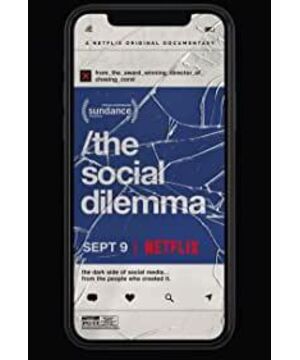I have a friend whose job is to use the company's mobile phone to make short videos, but on his mobile phone, Douyin and Kuaishou, or even Weibo and Xiaohongshu are never installed.
My friend said that it was because he knew that short videos were trying their best to attract you, keep you entertained, and create the illusion that you could learn something, until they took up a lot of your time and money.
What my friends said reminded me of a documentary I watched not long ago, and it is also an unpopular masterpiece that I would like to recommend to you today - "Surveillance Capitalism: The Smart Trap" .
Also known as "Social Dilemma" .
001
it's actually a horror movie
The documentary "Surveillance Capitalism: Smart Traps" brings out almost everything my friend could think of, and what he didn't think of at all, about smart traps.
The film was released last year and was nominated for Best Documentary at the 74th BAFTA Awards . Many fans who have watched it have commented that this documentary is actually a horror movie .
There are a lot of dry goods in the film, and the guests interviewed are industry leaders who have worked in giant companies such as Google, Yahoo, and Facebook, as well as industry research experts.
These guests told the truth that although they "betrayed" the companies and industries they had worked in, for them personally, betraying their own conscience and moral standards should be more terrifying.
The documentary mainly describes the pitfalls and drawbacks of the Internet in detail from three levels.
The three levels are: victims of smart products (that is, individuals), producers of smart products (that is, companies), and beneficiaries of smart products (that is, companies and countries). The content of the individual level will be relatively more.
I personally think that people who can watch this documentary seriously will either always be vigilant about the Internet from now on, or they will probably use the Internet to cut leeks.
Let's kick off!
002
We can't beat the phone
The first is the personal level. Compared with adults, teenagers will be more difficult to extricate themselves when faced with intelligence traps.
Take a smartphone for example. With the frequent use of mobile phones, artificial intelligence will penetrate more and more into the brains of teenagers.
Cell phones not only distract them, it also robs them of their time, judgment, and thinking skills, making them more vulnerable, risk-averse, introverted, and even more depressed.
Statistics show that the rate of American children born after 1996 getting a driver's license has dropped significantly, and the number of people going out on dates has also plummeted.
After all, teens are dealing with artificial intelligence, an enemy that knows everything about them , an algorithmic system that can predict their future actions, and kids don't know anything about them.
This is a game that has been decided from the start.
The documentary also specially filmed a fictional plot. The director set up a family of 6. The different situations of the 4 children when using mobile phones and the degree of influence by mobile phones deeply reflect the current social dilemma of teenagers.
Typical influences are as follows: the mobile phone does not leave the hand every day, and the virtual world in the mobile phone replaces the real world in life; relying on hearsay information, I start to build my own three views; I like to listen to one-sided words and give up independent thinking.
Adults aren't much better.
Take the simplest example. Even if we consciously choose the information we are interested in, we are still falling into a smart trap that has already been designed.
Because there is still a lot of information, the mobile phone does not push it to you.
003
you are being used
The second is the company level. Let me start with a well-known point of view in the Internet industry.
Today’s social media are no longer tools that sit in place waiting to be used, they all have their own goals and their own ways to achieve them.
To put it simply, it is to study your psychology through algorithms, and then use your psychology to deal with you, making you completely addicted, so as to achieve the purpose of subconsciously manipulating you.
On any smart product, every action you make, every place you click, every page you stay on, such as downloads, likes, deletions, browsing time, etc., will be carefully monitored and recorded. .
This data will be sent back to the intelligent system on the other side of the screen, which is used to build an increasingly accurate mental model.
Once you have this model, the intelligent system can easily predict what the person will do next.
The above is just one of the most commonly used means by every smart product producer.
Social APPs such as Facebook and Mouyin actually have a little-known identity— a tool with persuasion capabilities .
Many monopolists and totalitarians will use these tools to control their users and citizens, so as to achieve the purpose of manipulating public opinion at will.
004
they need to be regulated
More and more people have given up their curiosity and exploration of the real world, and instead are fascinated by the splendor and vanity of the virtual world.
Similarly, more and more companies have given up the exploration of space and space, and turned to study the mysteries of the inner world of human beings.
In recent years, a discipline called "growth hacking" has emerged in the United States.
The main work in this field is to hack into people's psychology, and then get more user registrations , higher user engagement, more growth, and also drive you to invite more people to participate.
Many foreign universities have set up courses similar to "growth hacking". According to the big coffee in the film, the executives of many giant companies have liked and studied these courses.
In addition to learning to make us addicted to products, these giant companies have also allowed us to quickly transition from the era of information flooding to the era of false information.
In fact, it was these companies that worked with us to create a system that was biased towards disinformation.
While it's not something we want to do on our own, false information is more appealing than real information, and it can make more money for companies.
Studies have shown that a fake news spreads 6 times faster than a real news.
It is difficult for us to stop the spread of false information now, because artificial intelligence is already operating today's online world. This also leads to another major issue - network regulation.
Fortunately, in recent years, most countries have introduced their own cybersecurity laws. my country's "Internet Security Law of the People's Republic of China" came into effect on June 1, 2017.
005
How to avoid the smart trap?
The biggest highlight of the documentary "Surveillance Capitalism: The Smart Trap" is also its biggest shortcoming, that is, the whole film has been introducing the negative effects of artificial intelligence, but not the benefits it brings.
Fortunately, there are many countermeasures mentioned in the film for smart traps. for example:
When minors use smart products, adults should guide and supervise them;
It is best for minors not to own a personal smartphone or computer until they are in high school;
Adults should not bring their mobile phones into the bedroom half an hour before going to bed, or directly disconnect from the Internet;
Parents should be role models and work with their children to overcome the bad habit of relying on smart products.
Do you have other coping strategies for preventing your phone addiction? Feel free to leave a message to share.
The above pictures are all from the Internet, if there is any infringement, please contact to delete
View more about The Social Dilemma reviews











